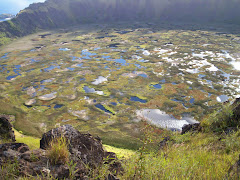 One of the accepted truths of the alternative energy business has been that we'd always need oil to fuel big jets--but tiny algae could refute that assumption.
One of the accepted truths of the alternative energy business has been that we'd always need oil to fuel big jets--but tiny algae could refute that assumption.
(Image: NASA photo of an apparent algae bloom in Canada's Lakes Winnipeg (right) and Manitoba. Credit: Jacques Descloitres, MODIS Rapid Response Team, NASA/GSFC)
News reports in recent months include new efforts by at least two airlines to wean themselves of petroleum-based kerosene fuel.
And that's important for Hawai'i, where 90 percent of our energy comes from fossil fuel, and, in the words of the federal Energy Information Administration, "The transportation sector leads energy demand in Hawaii due in large part to heavy jet fuel use by military installations and commercial airlines."
Hawai'i is actively involved in the effort to produce biofuels, including ones made from algae--which are being touted as a source of jet fuel. More on that later.
In February, Virgin Atlantic flew one of its 747s from London to Amsterdam on a mix that included 20 percent biofuel mixed with petroleum jet fuel.
"It makes great business sense to investigate lower carbon alternatives to existing technologies," the airline said on its website.
More recently, the Dutch airline KLM has announced it plans test flights later this year, using biofuel made from algae. (See the Radio Netherlands report at http://www.radionetherlands.nl/currentaffairs/region/netherlands/080526-klm-algae.)
KLM has identified the planes it feels can move to algae-based fuel first, and it says it hopes to eventually run the entire fleet on the stuff. As with Virgin, its initial flights will use a mix of algae-based vegetable oil and petroleum-based kerosene.
In its pilot program, KLM is working with a firm called AlgaeLink (see www.algaelink.com.)
But there are plenty of others in the business.
See www.greenfuelonline.com for information on GreenFuel Technologies Corp. and its efforts. One of the keys ot GreenFuel's effort it that it would pull carbon dioxide out of industrial emission stacks, converting it onsite into fuel.
"GreenFuel uses a portfolio of technologies to profitably recycle CO2 from smokestack, fermentation, and geothermal gases via naturally occurring species of algae. Algae can be converted to transportation fuels and feed ingredients or recycled back to a combustion source as biomass for power generation. Industrial facilities need no internal modifications to host a GreenFuel algae farm. In addition, the system does not require fertile land or potable water," the firm's website says.
Hawai'i's most recent involvement in algae-based fuel came late last year, when the energy firm Royal Dutch Shell announced it is collaborating with HR Biopetroleum to study growing oil-producing algae in salt-water ponds at the Natural Energy Laboratory of Hawai'i in Kona. Their joint venture is called Cellana and Shell is the majority partner.
While there is discussion elsewhere of using algae genetically modified to improve their suitability for the production of oil, Shell says it's not going that route.
"The facility will grow only non-modified, marine microalgae species in open-air ponds using proprietary technology. Algae strains used will be indigenous to Hawaii or approved by the Hawaii Department of Agriculture. Protection of the local environment and marine ecosystem has been central to facility design. Once the algae are harvested, the vegetable oil will be extracted. The facility’s small production volumes will be used for testing," Shell said in a press release.
Scientists will work with the program to identify those microalgae species that produce the most oil.
“HR Biopetroleum’s proven technology provides a solid platform for commercial development and potential deployment worldwide. Shell’s expertise and commitment to next generation biofuels complements our own strengths, and makes this a truly collaborative partnership," said Mark Huntley, HR Biopetroleum Chief Science Officer, in the press release.
But none of this is really new. The U.S. Department of Energy has been researching biofuel from algae since the 1970s. Here is a report on that research: www1.eere.energy.gov/biomass/pdfs/biodiesel_from_algae.pdf.
One of the amusing points of this 1998 report is that it suggests algae-biofuel doesn't make economic sense because it would be two to three times the cost of petroeum. However, that was written when oil was selling at between $20 and $30 a barrel.
For airlines, algae biofuel provides a way to be greener--to reduce an airline's carbon footprint--but it might also be cheaper than oil, which at this writing stood at $126 a barrel.
© 2008 Jan W. TenBruggencate








